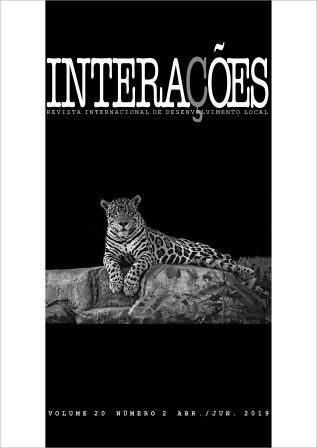Ethics perception: evidence from accountants and accounting students in Brazil
Palavras-chave:
ethics code, accountants’ ethics, ethics perception, Brazil.Resumo
Due to the new international ethics standards law, knowing what Brazilian accountants and accounting students perceive as ethical is extremely important. An online survey with 29 questions was conducted in MS/Brazil with different scenarios, involving different aspects that may influence someone’s decision, to assess the acceptance of unethical behaviors. The results showed difference in the ethics perception by students and accountants, but the difference was greater based on gender.Referências
ABDOLMOHAMMADI, M. J.; READ, W. J.; SCARBROUGH, D. P. Does selection-socialization help to explain accountants ‘weak ethical reasoning? Journal of Business Ethics, v. 42, n. 1, p. 71-81, Jan. 2003.
ADKINS, Nell; RADTKE, Robin R. Students' and Faculty Members Perceptions of the Importance of Business Ethics and Accounting Ethics Education: Is There an Expectations Gap? Journal of Business Ethics, v. 51, n. 3, p. 279-300, May 2004.
ALVES, F. J. S. Adesão do contabilista ao código de ética da sua profissão: um estudo empírico sobre suas percepções. Advisor: Lázaro Plácido Lisboa. 2005. 273 f. Thesis (Doctorate in Accounting) – Universidade de São Paulo, São Paulo, SP, 2005.
ALVES, F. J. dos S.; LISBOA, N. P.; WEFFORT, E. F. J.; ANTUNES, M. T. P. Um estudo empírico sobre a importância do código de ética profissional para o contabilista. Revista de Contabilidade e Finanças, v. 18, n. special, 2007.
ANTONOVZ, T. Atitudes éticas dos contadores: evidências recentes de uma pesquisa com alunos e profissionais. Advisor: Márcia Maria dos Santos Bortolocci Espejo. 2010. Dissertation (Master in Accounting) - Universidade Federal do Paraná (UFPR), Curitiba, PR, 2010.
ANTONOVZ, T.; STANLEY, C.; ESPEJO, M. M. S. B. (2016). Ethical attitudes of accountants in Brazil: recent evidence from students’ and accounting professionals’ survey. International Research Journal of Applied Finance, v. 7, p. 188-201, Aug. 2016.
BIAGGIO, Â. M. B. Universalismo versus relativismo no julgamento moral. Psicologia, Reflexão e Crítica, Porto Alegre, v. 12, n. 1, 1999.
CARRANÇA, T. Contador terá que reportar irregularidade a partir do ano que vem. Available in: http://www.valor.com.br/empresas/4768369/contador-tera-que-reportar-irregularidade-partir-do-ano-que-vem. Accessed in: 7 July 2016.
CONSELHO FEDERAL DE CONTABILIDADE (CFC). Aplicação da Noclar no Brasil é tema na Ifac. BRASÍLIA: CFC, 2018. Available in: http://cfc.org.br/noticias/aplicacao-da-noclar-no-brasil-e-tema-de-reuniao-na-ifac/. Accessed in: 13 Mar. 2018.
EMERSON, T.; STANLEY, C. W.; CONROY, S. J. Ethical attitudes of accountants: recent evidence from a practitioners’ survey. Journal of Business Ethics, v. 71, p. 73-87, 2007.
GILLES, P. W. A nova Ética. 2. ed. Rio de Janeiro: Rosa dos Tempos, 1994.
GILLIGAN, C. In a different voice. Cambridge, Mass: Harvard University Press, 1982.
LISBOA, P. L. Ética geral e profissional em contabilidade. São Paulo: Saraiva, 1996.
LOE, T. W.; FERRELL, L.; MANSFIELD, P. A review of empirical studies assessing ethical decision making in business. Journal of Business Ethics, v. 25, p. 185-204, 2000.
SÁ, A. L. Ética Profissional. 4. ed. São Paulo: Atlas, 2001.
SANTOS, M. F. dos. Sociologia fundamental e ética fundamental. 2. ed. São Paulo: Logos, 1959.
SARBANES-OXLEY ACT OF. Senate and House of Representatives of the United States of América. Public Law 107-204, approved July 30, 2002, 116 Stat. 745. Washington, 2002.
SROUR, R. H. Ética empresarial sem moralismo. Revista de Administração, São Paulo, v. 29, n. 3, p. 3-22, July/Sept. 1994.
Downloads
Arquivos adicionais
Publicado
Como Citar
Edição
Seção
Licença
Direitos Autorais para artigos publicados nesta revista são do autor, com direitos de primeira publicação para a revista. Em virtude de aparecerem nesta revista de acesso público, os artigos são de uso gratuito, com atribuições próprias, em aplicações educacionais e não-comerciais.


